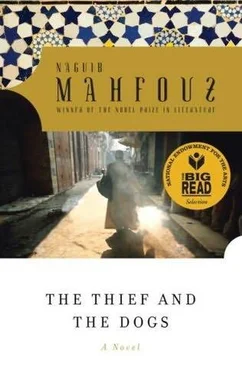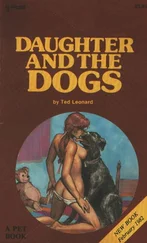Naguib Mahfouz
The Thief and the Dogs
No writer of the modern Arab world has enjoyed a success in literature to approach that of Naguib Mahfouz. His work has become appreciated as a voluminous and sharply focused reflection of the Egyptian experience through the turbulent changes of the twentieth century. His fame within the Middle East is consequently unrivalled and the importance of his score of published works has been widely noted abroad. Many of his stories have previously appeared in English and other foreign languages and he has received honorary awards and degrees from Denmark, France and the Soviet Union. His achievements are all the more extraordinary for his having remained employed full-time for over thirty years in various departments of the Egyptian civil service in which he reached administrative positions of importance before his retirement in 1972.
The work of Mahfouz, then, reveals many of the changes of aspiration and orientation of Egyptian intellectuals over the span of his lifetime. In the thirties, a time when Mahfouz was emerging from Cairo University with a degree in Philosophy, Egyptians were struggling for equilibrium between the contradictory pulls of pride in Islam or in Ancient Egypt.
Their dilemma was compounded by their awareness of the attitude of foreigners towards their national heritage. They witnessed every day in the streets of Cairo the enthusiasm of archaeologists and tourists for the treasures of their ancient tombs and pyramids but they also knew of the glories of their religious, architectural, cultural and, above all, language heritage from Islam and the Arabs. And they were only too aware of the disdain of foreigners for the state of their contemporary government and society.
Mahfouz's dilemma in orientation lasted, however, only for the thirties, during which period he composed a rather strange medley of short stories dealing with the life of his own time and several works on the ancient history of his country. He translated an English text on ancient Egypt and wrote three historical novels depicting aspects of the lives and times of the pharaohs. In them his particular concern was for the relationships between rulers and the people and the uprising of the Egyptians against the Hyksos invaders, subjects of obvious interest to his readers critical of the despotic Egyptian monarchy under King Farouk, himself dominated by the strong British presence in the country. By the early forties, however, Mahfouz had abandoned his plan of constructing a massive series of novels based on ancient history and almost all his work since has related specifically to the Egypt that he has himself witnessed.
In that middle period of his work, then, he wrote a series of novels, first published obscurely and later to achieve great and continuing popularity, that dealt both with his own milieu, the Muslim middle-class of Cairo, and with that of the colorful characters of the conservative quarters of the ancient city. These were followed by his Trilogy that caused a literary sensation in the late fifties and consequently drew attention back to his earlier works. A voluminous work, the Trilogy presents a detailed panorama of the life experiences of three generations of a Cairo merchant-class family over the turbulent first half of this century. It is a fascinating study of the social, political, religious and philosophical strains experienced by his countrymen at that time of fast transition and the consequent effects on their personal relationships.
Following the 1952 Revolution of General Naguib and Colonel Nasser, Mahfouz wrote nothing for seven years. His 1959 Awlad Haritna (translated as Children of Gebelawi) was serialized in the daily newspaper al-Ahram and never since republished in Egypt. It is a pessimistic portrayal in allegorical form of man's struggle for comprehension and solution of the problems of his existence. Discouraged by the furor the novel caused in traditional and religious circles, Mahfouz again refrained from writing for some time, until his publication of his present novel The Thief and the Dogs in 1961. This was well received and was followed by a stream of fine novels in the sixties that detailed with delicacy and great courage the crisis of identity and conscience suffered by Egyptian intellectuals during that period of pervasive malaise and dissatisfaction.
His more recent works, following the 1967 war with Israel, have been circumspect and philosophical and he has favored the short story and the short play for expression of his frequently allegorical themes. However, al-Hubb Tahta al-Matar (love in the Rain) published in mid-1973 in book form only, without serialization in the widely-read daily press, contrasted (and by implication criticized) the free and at times immoral life which continued in Cairo with the soldiers' endless waiting, in discomfort and fear of death, for the inevitable renewal of warfare with Israel.
The present novel, then, was first published in 1961 and both its subject treatment and style marked distinct changes from Mahfouz' earlier work.
This is a psychological novel, impressionist rather than realist; it moves with the speed and economy of a detective story. Here Mahfouz uses the "stream of consciousness" technique for the first time to show the mental anguish of his central figure consumed by bitterness and a desire for revenge against the individuals and the society who have corrupted and betrayed him and brought about his inevitable damnation. It is a masterly work, swiftly giving the reader a keenly accurate vision of the workings of a sick and embittered mind doomed to self-destruction. And, as he inevitably comes to the protagonist's disillusionment and despair, the reader gains intimate and authentic impressions of the values and structures of Egyptian society of the period.
Trevor Le Gassick
Once more he breathed the air of freedom. But there was stifling dust in the air, almost unbearable heat, and no one was waiting for him; nothing but his blue suit and gym shoes.
As the prison gate and its unconfessable miseries receded, the world — streets belabored by the sun, careening cars, crowds of people moving or still — returned.
No one smiled or seemed happy. But who of these people could have suffered more than he had, with four years lost, taken from him by betrayal? And the hour was coming when he would confront them, when his rage would explode and burn, when those who had betrayed him would despair unto death, when treachery would pay for what it had done.
Nabbawiyya. Ilish. Your two names merge in my mind. For years you will have been thinking about this day, never imagining, all the while, that the gates would ever actually open. You'll be watching now, but I won't fall into the trap. At the right moment, instead, I'll strike like Fate.
And Sana? What about Sana?
As the thought of her crossed his mind, the heat and the dust, the hatred and pain all disappeared, leaving only love to glow across a soul as clear as a rain-washed sky.
I wonder how much the little one even knows about her father? Nothing, I suppose. No more than this road does, these passers-by or this molten air.
She had never been out of his thoughts, where bit by bit she'd taken shape, like an image in a dream, for four long years. Would luck now give him some decent place to live, where such love could be equally shared, where he could take joy in being a winner again, where what Nabbawiyya Ilish had done would be no more than a memory, odious, but almost forgotten?
You must pull together all the cunning you possess, to culminate in a blow as powerful as your endurance behind prison walls. Here is a man — a man who can dive like a fish, fly like a hawk, scale walls like a rat, pierce solid doors like a bullet!
Читать дальше












